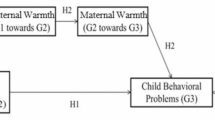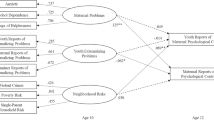Abstract
We investigated age-based changes in mothers’ complaints about offspring behavioral opposition, and offspring reports of opposition in a prospective longitudinal design (N = 821). Maternal complaints declined from pre-adolescence to early adulthood, but more slowly in low socioeconomic status (SES) and single-parent families. Mothers complained more about first- than later-born children, but showed no average differences for offspring gender, race, SES, or single parent status. Complaints covaried with youth-reported opposition, but effects involving SES, single-parent status, and birth order remained significant after opposition was controlled; this finding is interpreted to reflect social contextual differences in maternal beliefs. Youth opposition was stable to age 16, then decreased; higher levels were associated with earlier birth order and low SES among European-Americans. Our results have implications for parenting interventions, indicating that parents may benefit from education about the normative, gradual increase in concordance between their own expectations and their child’s behavior from early to late adolescence. Further, parenting interventions may be strengthened by actively attending to social contextual factors that shape parental belief systems and values.

Similar content being viewed by others
References
Baldwin, A. L., Baldwin, C. P., Kasser, T., Zax, M., Sameroff, A., & Seifer, R. (1993). Contextual risks and resiliency during late adolescence. Development & Psychopathology, 5, 741–761.
Brooks-Gunn, J., Duncan, G. J., Klebanov, P. K., & Sealand, N. (1993). Do neighborhoods influence child and adolescent development? American Journal of Sociology, 99, 353–395.
Burden, R. L., & Perkins, R. (1987). Birth order: some possible effects on children’s perceptions of themselves and their siblings. Educational and Child Psychology, 4, 35–45.
Cohen, P., & Cohen, J. (1996). Life values and adolescent mental health. Mahwah, NJ: Erlbaum.
Cohen, P., Cohen, J., Aiken, L. S., & West, S. G. (1999). The problem of units and the circumstance for POMP. Multivariate Behavioral Research, 34, 315–346.
Cohen, P., Johnson, J., Lewis, S. A., & Brook, J. S. (1990). Single parenthood and employment: Double jeopardy? In J. Eckenrode & S. Gore (Eds.), Stress between work and family (pp. 117–132). New York: Plenum.
Cohen, P., Kasen, S., Chen, H., Hartmark, C., & Gordon, K. (2003). Variations in patterns of developmental transitions in the emerging adult period. Developmental Psychology, 39, 657–669.
Collins, W. A. (1990). Parent-child relationships in the transition to adolescence: Continuity and change in interaction, affect and cognition. In R. Montemayor, G. Adams, & T. Gullotta (Eds.), Advances in adolescent development: From childhood to adolescence: A transitional period? (Vol. 2, pp. 85–106). Beverly Hills, CA: Sage.
Collins, W. A., & Laursen, B. (1992). Conflict and relationships during adolescence. In C. U. Schantz & W. W. Hartup (Eds.), Conflict in child and adolescent development (pp. 216–241). New York: Cambridge.
Conger, R. D., Ge, X., Elder, G. H., Lorenz, F. O., & Simons, R. L. (1994). Economic stress, coercive family process, and developmental problems of adolescents. Child Development, 65, 541–561.
Crick, N. R., & Grotpeter, J. K. (1995). Relational aggression, gender, and social-psychological adjustment. Child Development, 66, 710–722.
Dunn, J., & Slomkowski, C. (1992). Conflict and the development of social understanding. In C. U. Shantz & W. W. Hartup (Eds.), Conflict in child and adolescent development (pp. 70–92). New York: Cambridge University Press.
Eagly, A. H., Wood, W., & Diekman, A. B. (2000). Social role theory of sex differences and similarities: A current appraisal. In T. Eckes & H. M. Trautner (Eds.), The developmental social psychology of gender (pp. 123–174). Mahwah, NJ: Erlbaum.
Eccles, J. S., Midgley, C., Wigfield, A., Buchanan, C.M., Reuman, D., Flanagan, C., & Mac Iver, D. (1993). Development during adolescence: The impact of stage–environment fit on young adolescents’ experiences in schools and in families. American Psychologist, 48, 90–101.
Eisenman, R. (1992). Birth order, development and personality. Acta Paedopsychiatrica, 55, 25–27.
George, L. K. (1993). Sociological perspectives on life transitions. Annual Review of Sociology, 19, 353–373.
Gutman, L. M., Friedel, J. N., & Hitt, R. (2003). Keeping adolescents safe from harm: Management strategies of African-American families in a high risk community. Journal of School Psychology, 41, 167–184.
Hanson, T. L., McLanahan, S., & Thomson, E. (1997). Economic resources, maternal practices and children’s well-being. In G. J. Duncan & J. Brooks-Gunn (Eds.), Consequences of Growing up poor (pp. 190–238). New York: Russell Sage.
Hartup, W. W. (1984). The peer context in middle childhood. In W. A. Collins (Ed.), Development during middle childhood: The years from six to twelve (pp. 240–282). Washington, D. C.: National Academy Press.
Hollingshead, A. B., & Reidlich, F. C. (1958). Social class and mental illness: A community study. New York: Riley.
Holmbeck, G. N., Paikoff, R. L., & Brooks-Gunn, J. (1995). Parenting adolescents. In M. Bornstein (Ed.), Handbook of parenting (Vol. 1, pp. 91–118). Hillsdale, NJ: Erlbaum.
Jarrett, R. L. (1997). Bringing families back in: Neighborhood effects on child development. In J. Brooks-Gunn, G. L., Duncan, & J. L. Aber, (Eds.) Neighborhood poverty: Policy implications in studying neighborhoods (Vol. 2, pp. 48–64). New York: Russell Sage Foundation.
Kogan, L. S., Smith, J., & Jenkins, S. (1977). Ecological validity of indicator data as predictors of survey findings. Journal of Social Service Research, 1, 117–132.
Kotchick, B. A., & Forehand, R. (2002). Putting parenting practices in perspective: A discussion of the contextual factors that shape parenting practices. Journal of Child and Family Studies, 11, 255–269.
Lamborn, S. D., Dornbusch, S. M., & Steinberg, L. (1996). Ethnicity and community context as moderators of the relations between family decision making and adolescent adjustment. Child Development, 67, 283–301.
Laursen, B., & Collins, W. A. (1994). Interpersonal conflict during adolescence. Psychological Bulletin, 115, 197–209.
Littell, R. C., Miliken, G. A., Stoup, W. W., & Wolfinger, R. D. (1996). SAS system for mixed models. Cary, NC: SAS Institute.
Loeber, R., Drinkwater, M., Yin, Y., Anderson, S. J., Schmidt, L. C., & Crawford, A. (2000). Stability of family interaction from ages 6 to 18. Journal of Abnormal Child Psychology, 28, 353–369.
Maccoby, E. E. (1992). The role of parents in the socialization of children: An historical overview. Developmental Psychology, 28, 1006–1017.
Moffitt, T. E., Caspi, A., Rutter, M., & Silva, P. A. (2001). Sex differences in antisocial behavior. New York: Cambridge.
Smetana, J. G. (2000). Middle-class African American adolescents’ and parents’ conceptions of parental authority and parenting practices: A longitudinal investigation. Child Development, 71, 1672–1686.
Whittington, L. A., & Peters, H. E. (1996). Economic incentives for financial residential independence. Demography, 33, 82–97.
Author information
Authors and Affiliations
Corresponding author
Rights and permissions
About this article
Cite this article
Ehrensaft, M.K., Cohen, P., Chen, H. et al. Developmental Transitions in Youth Behavioral Opposition and Maternal Beliefs in Social Ecological Context. J Child Fam Stud 16, 577–588 (2007). https://doi.org/10.1007/s10826-006-9108-z
Published:
Issue Date:
DOI: https://doi.org/10.1007/s10826-006-9108-z




